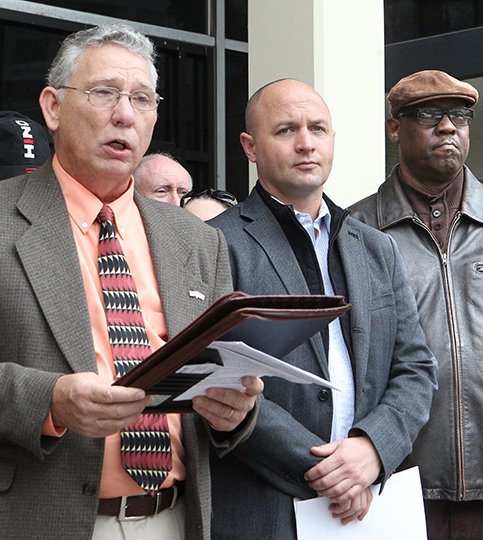The group that mounted successful petition drives against annexation ordinances the Hot Springs Board of Directors adopted earlier this year is circulating a referendum petition on the water rate increase that will take effect next month.
The Concerned Citizens Coalition assembled Tuesday morning in front of City Hall to announce its referendum campaign on the ordinance the board adopted Nov. 21. It raises the minimum monthly charge for a residential five-eighths inch meter inside the city from $4.99 to $13 by 2021. Base rates for residential customers outside the city will increase from $7.50 a month to $19.50 by 2021.
Resident and nonresident rates will increase 3-percent a year after 2021.
The increase will be reflected on the first bills rendered in January, with minimum monthly charges increasing $3 for resident customers and $4.50 for nonresident customers. The base rate is assessed on the first 1,000 gallons of usage. Volumetric charges are applied to monthly usage exceeding 1,000 gallons.
The coalition, which Doug Jones, president of the Watchmen of Garland County, described Tuesday as a collection of activist civic and bipartisan political groups, hopes to thwart the rate increase. A 1996 ordinance establishes a 30-day deadline after passage of any ordinance or resolution for filing a referendum petition.
The group began circulating the petition last week and is also collecting signatures in support of ballot initiatives to return the city to the mayor/alderman system it abandoned in 1986 and for an autonomous water and sewer board or a regional water authority elected by customers.
The signatures of 1,425 registered voters residing inside the city, or 15 percent of the 9,500 votes cast in the 2014 mayoral race, are needed to compel the board to schedule a referendum election. The coalition gathered more than 6,000 signatures earlier this year in support of referendum petitions on two annexation ordinances, prompting the board to repeal the ordinances rather than schedule a special election.
Willie Wade Jr., president of the Difference Makers of Hot Springs, said base rate increases will be felt most profoundly by customers subsisting month to month on fixed incomes.
City officials have said the consistent revenues base rates yield are attractive to bondholders who will own the $110 million of debt the city plans on issuing for capital improvements to the water system. Securing the bonds with revenue from volumetric rate increases is not practical, the city has said, as those revenues are a function of usage and fluctuate with weather patterns.
"The most affected are those already struggling to get by month to month on fixed incomes," Wade said Tuesday morning. "Their rates will increase the same amount as affluent bank presidents and local executives and city employees making over $100,000 a year. Clearly little consideration for this population is involved in the rush to pass this increase in water rates."
Matt McKee, District 9 justice of the peace and chairman of the Garland County Republican Party Committee, said the inability of the ordinance to tie bond funds to specific capital improvements allows the city to spend the proceeds on projects unrelated to the water system.
He pointed to the $545,791 the city's 2017 budget appropriated from the Water Fund for the city's $4.9 million communications upgrade. This year's budget also appropriated $638,352 from the Solid Waste Fund and $411,737 from the Wastewater Fund to help pay for the radio project.
"The board's history demonstrates that they consistently transfer funds from such enterprise funds for numerous unrelated purposes," McKee said Tuesday morning.
The ordinance's introductory section references "betterments" and "improvements" to the water system, explaining they will be paid for by revenue bonds secured by the rate increase, but doesn't detail which projects the bonds will fund.
City Attorney Brian Albright told the board last month that binding the bond funds to specific projects exposes the city to illegal exaction litigation should the proceeds be used for purposes not stated in the enabling ordinance, which he said would make investors and underwriters of the debt uneasy.
City officials have said $95 million of the $110 million in bonds issued over five years will pay for infrastructure needed to bring the city's 23 million-gallon average day allocation from Lake Ouachita online.
McKee said, as a non-city resident, he has no voice on water policy despite paying a 50-percent premium for service. About half of the more than 35,000 meters served by the city's water utility are beyond the corporate limits and subject to the surcharge.
The coalition called for oversight of the water utility to be transferred from the city board to a regional water authority accountable to all customers and beyond the purview of city directors. The city abolished the Waterworks Commission and Waterworks and Sewer Commission in 1991, replacing it with a Water and Sewer Advisory Commission the board disbanded in 1994. A new commission was subsequently formed, but the board repealed the enabling ordinance in 1995.
The adoption of an ordinance later that year vested authority of the water utility in another commission, but it was repealed in a November 1995 referendum election by a 3,045-1,167 margin.
"My primary point of contention has always been that out-of-city customers have no voice and no vote," McKee said. "There are now more out-of-city water customers than there are in the city, and many people think it's time to correct this situation."
The coalition announced it will hold a town hall meeting at the Garland County Library Dec. 14 at 5:30 p.m. to discuss the rate increase.
Local on 12/06/2017